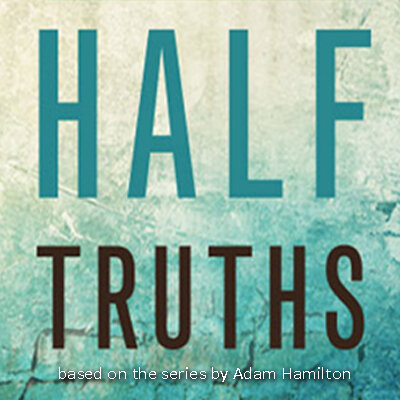¿ God Helps Those Who Help Themselves ?
Half-Truths - Part 4
(based on the book by Adam Hamilton)
July 27, 2025
Psalm 18:6, 16-17, Psalm 121:1-2, Philippians 2:12-14
see also: Daniel 9:15-19, Ephesians 2:4-10
However, God is rich in mercy. He brought us to life with Christ while we were dead as a result of those things that we did wrong. He did this because of the great love that he has for us. You are saved by God’s grace!
Ephesians 2:4-5
_______________
“God helps those who help themselves.”
Odds are you have probably said or heard this exhortation at some point in your life. Most Americans believe it is found in the Bible, though no such Scripture exists. In truth, the source is unknown, although it is often attributed to Benjamin Franklin who popularized the phrase in the 1730’s.
At first glance, it seems to express good Biblical truth even if it is not directly quoted from Scripture. Surely God doesn’t want us to just sit back and do nothing. As James writes, “Faith without works is dead” (James 2:17). Likewise, Paul writes to the Philippians to “carry out (or work out) your salvation with fear and trembling” (Philippians 2:12-13)
Anyone working for social justice knows that one of the most important tasks is to help people stand on their own, to break the cycles of poverty, addiction, crime, or whatever else holds them back from being productive members of society who live with a sense of purpose and dignity. We “teach people to fish” rather than simply giving them an endless stream of free handouts.
Honestly, this is all good and true. We should encourage hard work and discipline both in life and in our journey of faith. We do have to “practice what we preach”. We must live out our salvation by fulfilling our baptismal covenant through our prayers, presence, gifts, service and witness. When we pray, God empowers us and guides us into action. Adam Hamilton writes, “Those who fought for civil writes did not simply pray at church. They prayed and then marched, knowing they were likely to be beaten and arrested and that God would somehow see them through.”
So what’s wrong with saying “God helps those who help themselves,” even if it’s not directly quoted from the Bible?
The trouble comes at two key points… when someone cannot help themselves, or when we cannot help ourselves.
We often see others in need and respond by saying that if they work hard and “help themselves,” God will help them out of whatever pit they find themselves in. In some ways, however, this says far more about our cultural work ethic and rugged individualism than it says about God. After all, if we could truly help ourselves, what need have we for God? Why pray at all if we could simply work harder and help ourselves solve whatever dilemma presses in?
More than that, it often becomes an excuse not to help others. Scripture consistently calls us to care for the poor, the orphan, the stranger, the widow, and the needy. In Matthew 25, Jesus tells us that whatever we have done for the least among us, we have done for him, and likewise whatever aid we have refused to others, we have refused for him. Rather than seeing those in need as people who should “pick themselves up by their own bootstraps”, we are called to see in them the face of Christ struggling under the weight of his own cross, and like Simon of Cyrene, perhaps God is calling us to help him carry it for awhile by bearing the burden of others (Matthew 27:32).
Challenging this well worn cliché is not a blanket affirmation of sloth or laziness. Rather it is a recognition that no matter how hard we work, there are times when we simply cannot help ourselves. Despite popular belief, not everyone was born with the same opportunities, abilities or connections. This is why God uses others to answer the cry of the needy, to help them when they don’t have a leg to stand on.
In the end, God helps those who CANNOT help themselves.
God is the God of the hopeless, the God who walks with us even in the valley of the shadow of death. This is grace, amazing grace, that saved even a blind wretch like me who could never save myself from the shackles of sin. When it comes to our salvation, not one of us can help ourselves.
Rather than condemning the helpless, perhaps it would do us well to sing that great hymn again… remembering that we were all lost and helpless, but God rescued us from the pit that we might sing His glorious and “Amazing Grace” all the more.





